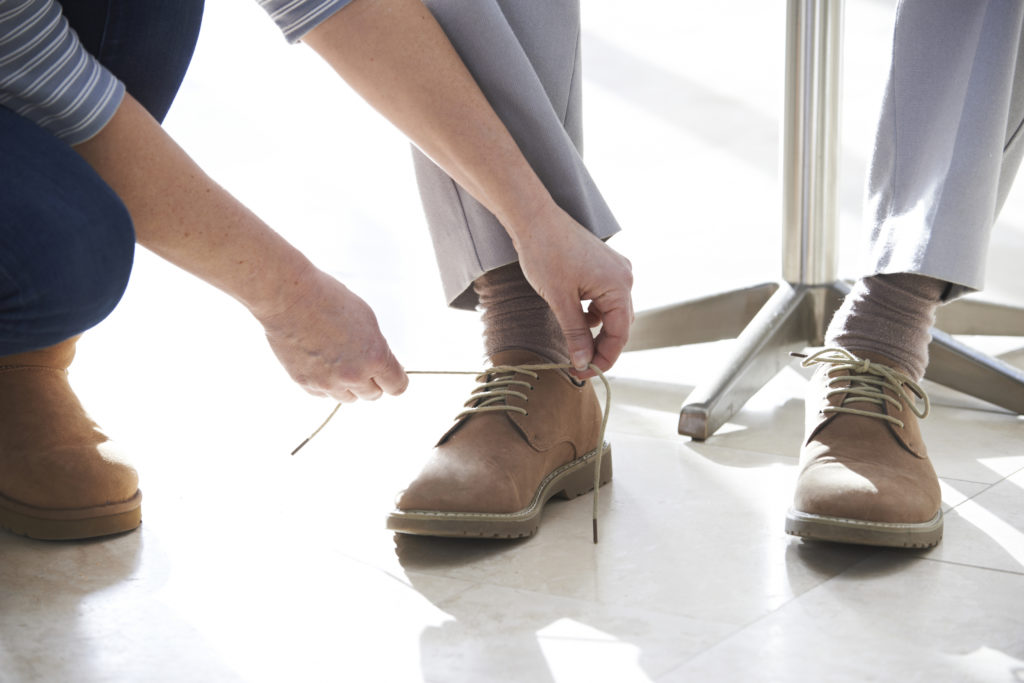Fall Prevention with Proper Senior Footwear
The first step to fall prevention should be wearing proper footwear. Here are some footwear suggestions for seniors.
Written by Stannah

While much of the discussion around fall prevention focuses in avoiding obstacles, it is important to look at footwear and analyse how they can increase the risk of falling, especially important among seniors.
As a child, we often desired shoes with bright colours and bold designs. A new pair of shoes may have made us feel as if we could run faster or jump higher. For the most part, many of these feelings were simply figments of our imagination; however, it sparks an interesting conversation about the impact of proper senior footwear. For seniors, footwear selection can be the difference between safe navigation and a potentially life-threatening fall.
If your elderly loved one is prone to falls, speaking with a podiatrist or foot health specialist could immediately help improve their situation. These doctors can perform a variety of tests and determine a footwear strategy that features an ideal combination of comfort and safety.
Wear Safe Footwear
Even when relaxing in your own home, safe footwear is extremely important for seniors. While walking barefoot may seem like a safe option, South Australia’s Seniors Information Service states that it actually be a great risk factor for falls. Slippers may also seem like a worthy alternative, but could actually be more dangerous, if not correctly suited for the specific needs of seniors.
Homestead Senior Care offers some footwear suggestions to help seniors reduce their chances of falling:
- Sturdy Support – Avoid shoes that are worn-out or overly flexible. Look for sturdy midsoles and minimal flexibility to ensure better stability.
- Proper Size – Procure shoes that are correctly fitted to your feet (a video guide to proper foot measuring is available here). Walking becomes difficult in footwear that is too big, and shoes that are too small can cause calluses and corns. The latter may also develop into chronic foot pain, further increasing the risk of falling.
- Close it Off – Seniors should avoid open-backed shoes. The insecure fit of these designs can cause instability. Choose shoes with ankle support.
- Stay Low – Proper senior footwear should have a sole less than 1.25cm and be free of any overly-padded insoles. Shoes that put seniors too high off the ground may cause a loss of balance. Low profile shoes with wider designs and more contact to the ground are recommended.
- Keep it Light – Heavy, thick-soled shoes provide stability but may impede mobility. Lightweight footwear is the best option for walking, but it’s important to avoid flimsy material or increased flexibility in the midsole.
- Tread Design – A balanced tread design can play a key role in preventing falls for seniors. An overly smooth sole may increase the likelihood of slips, while excessive grip can cause you to trip. Once a sole begins to show signs of wear, replace the shoe immediately.
- Easy Closure – Hook and loop closures, and Velcro straps, are ideal for seniors since they are easy to adjust. For seniors who prefer laces, it is imperative to ensure they are securely tied to provide a safe and comfortable fit.
Proper Footwear can take a load off your knees
For seniors or family caregivers looking to invest in proper footwear, Stay on Your Feet offers a shoe safety checklist to help make the perfect selection.
While proper footwear can help reduce the risk of falling, it can also help relief the stress on arthritic knees. Proper footwear for knee pain should provide support and cushioning under the heel. It has proven to be a relief to early stages of arthritic knee condition.
However, and even with safe footwear, stairs may still be a major impediment in the life of your elderly loved ones. Stannah Stairlifts help seniors maintain independence by providing the ability to safely navigate the stairs in their home.
